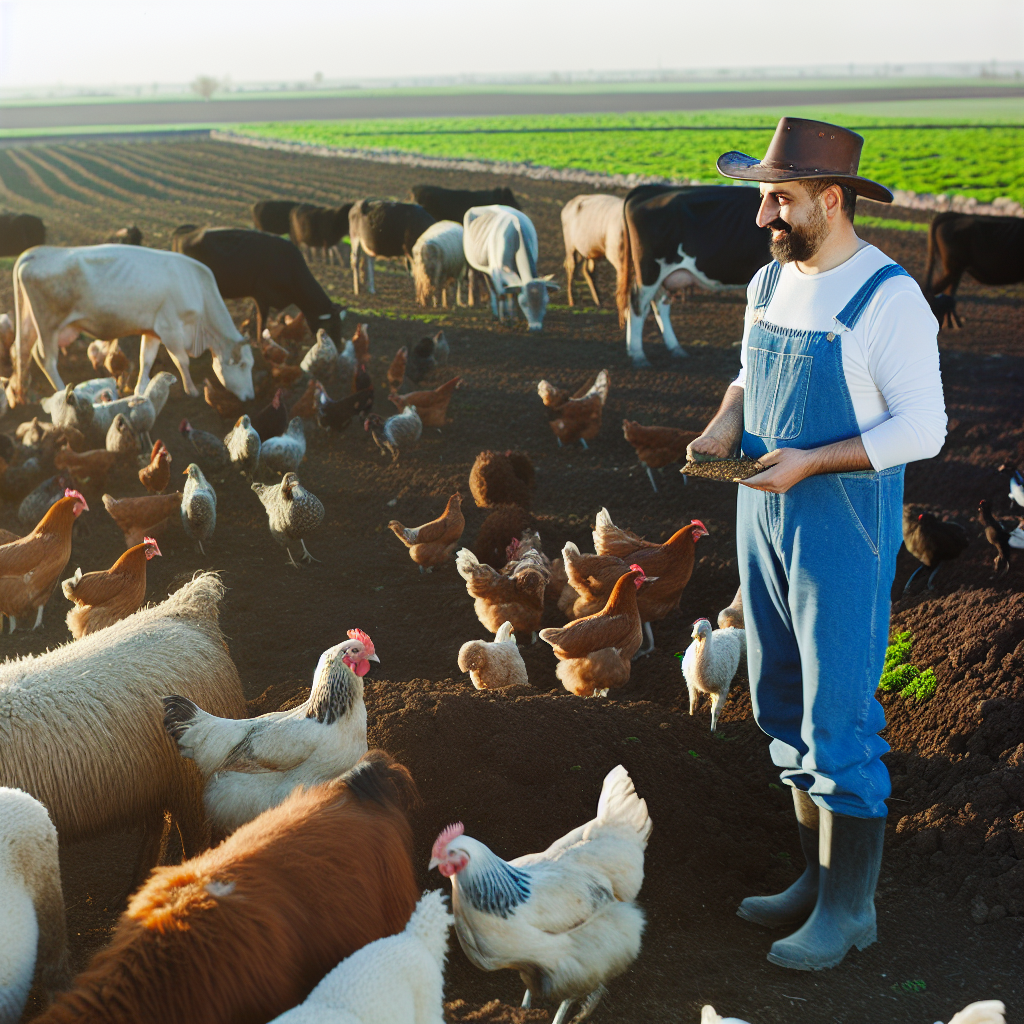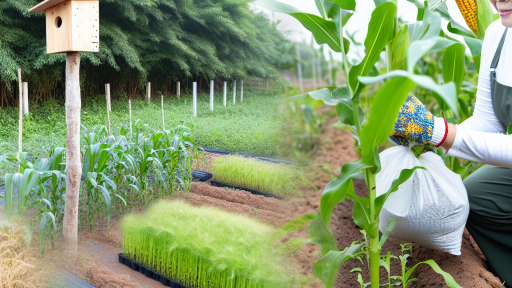Introduction to Farm-To-Table
Defining the Concept
Farm-to-table refers to a movement connecting food producers and consumers.
This concept emphasizes direct sourcing from local farms.
It promotes fresh, seasonal ingredients for nourishing meals.
Furthermore, this approach encourages sustainable farming practices.
In essence, farm-to-table aims to reduce food miles.
By doing so, it supports local economies and communities.
Moreover, it insists on ethical treatment of livestock and produce.
Consumers benefit from knowing the origin of their food.
This transparency enhances trust between farmers and consumers.
Moreover, it fosters appreciation for local agricultural efforts.
Importance of Ethical Animal Care
Ethical animal care is a crucial aspect of farm-to-table practices.
This commitment ensures livestock is treated humanely and sustainably.
Additionally, it prioritizes the animals’ well-being throughout their lives.
Farmers like Sarah Jenkins lead the charge in ethical farming.
Her farm utilizes practices that minimize animal stress and suffering.
Transform Your Agribusiness
Unlock your farm's potential with expert advice tailored to your needs. Get actionable steps that drive real results.
Get StartedBy focusing on animal welfare, they also produce healthier meat.
Furthermore, ethical treatment enhances the quality of dairy and eggs.
This approach aligns with consumer demand for high-quality products.
Ultimately, responsible farming practices contribute to a better food system.
Thus, farm-to-table encompasses not only food quality but ethics as well.
Importance of Ethical Animal Care in Agriculture
Defining Ethical Animal Care
Ethical animal care promotes humane treatment of livestock.
It emphasizes the welfare, health, and happiness of animals.
Farmers should adopt practices that prioritize animal comfort.
Moreover, ethical care involves providing adequate living conditions.
Benefits of Ethical Animal Care
Implementing ethical standards leads to healthier animals.
Healthy animals produce higher quality food products.
Additionally, consumer trust increases when animals are treated well.
This trust can boost sales and improve brand loyalty.
Societal Impact of Animal Welfare
Society increasingly values animal welfare in agriculture.
Public awareness campaigns have raised consciousness about animal rights.
Consumers often choose products from farms that ensure humane practices.
Consequently, farmers must align their practices with these values.
Methods for Ensuring Ethical Care
- Regular veterinary check-ups are crucial for animal health.
- Providing ample space reduces stress in animals.
- Offering proper nutrition supports growth and well-being.
Implementing these methods helps farmers adhere to ethical standards.
Challenges in Implementing Ethical Practices
Some farmers face financial constraints in adopting ethical care.
Costly infrastructure changes can deter improvements.
Additionally, lack of education may limit awareness of best practices.
Therefore, support and resources are essential for successful transitions.
The Role of Regulations and Certifications
Government regulations are vital for enforcing animal welfare standards.
Certifications help consumers identify ethical products easily.
Showcase Your Farming Business
Publish your professional farming services profile on our blog for a one-time fee of $200 and reach a dedicated audience of farmers and agribusiness owners.
Publish Your ProfileThese frameworks encourage farmers to adopt humane practices.
Principles of Farm-To-Table Practices
Commitment to Animal Welfare
Farm-to-table practices prioritize ethical treatment of animals.
Farmers like Maria Sommers embrace humane animal husbandry techniques.
This commitment fosters healthy animal populations and promotes biodiversity.
Additionally, it encourages consumers to support ethical producers.
Transparency in Sourcing
Transparency builds trust between consumers and producers.
Establishing connections to local farms strengthens community bonds.
For instance, the Green Pastures Farm shares its operations openly with customers.
This approach allows customers to understand where their food comes from.
Seasonal and Local Sourcing
Farm-to-table emphasizes the importance of seasonal ingredients.
Using local produce reduces carbon footprints significantly.
Many chefs collaborate with nearby farmers for fresh ingredients.
This practice supports local economies and encourages sustainable agriculture.
Minimizing Environmental Impact
Farm-to-table practices aim to reduce waste and resource use.
Techniques like composting and crop rotation enhance soil health.
Farmers adopt water conservation methods to preserve natural resources.
Consequently, these practices lead to more sustainable ecosystems.
Community Engagement
Engaging the community promotes collaborative efforts toward better practices.
Local food events raise awareness about sustainable farming.
Restaurants can host workshops to educate consumers about sourcing responsibly.
These initiatives create a sense of shared responsibility for food systems.
Learn More: The Role of Local Food Sourcing in Modern Farming
Benefits of Ethical Animal Treatment for Farms and Consumers
Enhanced Animal Welfare
Ethical animal treatment prioritizes the well-being of farm animals.
This approach reduces stress and suffering among livestock.
Moreover, healthier animals produce better quality products.
Improved Product Quality
Consumers often notice a significant difference in product quality.
Ethically raised animals yield high-quality meat and dairy products.
These products typically possess richer flavors and better textures.
Boosting Consumer Trust
Farmers practicing ethical treatment gain consumer trust.
Transparency in animal care builds loyalty among customers.
As a result, consumers may be willing to pay premium prices.
Supporting Sustainable Agriculture
Ethical animal care aligns with sustainable farming practices.
These practices contribute to healthier ecosystems and biodiversity.
Farmers benefit through long-term viability and reduced environmental impact.
Economic Advantages
Adopting ethical practices can lead to economic benefits for farmers.
Better animal care often translates to lower veterinary costs.
Additionally, premium pricing for ethically sourced products is possible.
Enhanced Reputation and Marketability
Farms known for ethical practices stand out in the market.
They attract customers who value animal welfare and sustainability.
Such reputations can lead to increased brand loyalty and sales.
Showcase Your Farming Business
Publish your professional farming services profile on our blog for a one-time fee of $200 and reach a dedicated audience of farmers and agribusiness owners.
Publish Your ProfileDelve into the Subject: Managing a Successful Community Supported Agriculture
Challenges in Implementing Ethical Animal Care on Farms
Economic Pressures
Farmers face significant economic pressures in maintaining ethical animal care.
Profit margins often dictate priorities over animal welfare.
Additionally, the costs associated with higher standards can be prohibitive.
Consequently, many farmers struggle to balance ethics and financial viability.
Regulatory Complexity
Navigating animal welfare regulations can be overwhelming for farmers.
Different regions have varying standards and compliance requirements.
This creates confusion and potential legal pitfalls.
Moreover, some farms lack the resources to stay updated on regulatory changes.
Consumer Awareness and Demand
Consumer awareness of ethical animal care is increasing.
However, many shoppers do not prioritize ethical considerations when purchasing food.
This disconnect affects farmers’ ability to sell ethically-raised products at a premium.
To compound the issue, misinformation about ethical practices can mislead consumers.
Access to Resources
Many farmers lack access to resources that enable ethical treatment of animals.
For instance, some farms may not have sufficient financial support.
Education on animal welfare practices may also be limited.
Furthermore, access to quality veterinary care can be a challenge in rural areas.
Infrastructure Limitations
Adequate infrastructure is crucial for ethical animal care practices.
Unfortunately, outdated facilities can hinder these efforts.
Several farms struggle with inadequate housing for animals.
This results in overcrowding and impacts overall animal health and welfare.
Competition with Industrial Farms
Ethical farms often compete with large industrial farms.
These industrial farms operate on economies of scale, drastically lowering costs.
This pricing advantage makes it difficult for ethical farms to compete.
As a result, ethical animal care sometimes takes a backseat in the market.
Find Out More: Marketing Tips for Direct-to-Consumer Farm Sales

Case Studies: Successful Farm-To-Table Models with Ethical Animal Care
Introduction to Ethical Animal Care
Farm-to-table models emphasize the importance of ethical animal care.
These models ensure animals are treated with respect and dignity.
They prioritize humane practices throughout the farming process.
The Green Pastures Initiative
The Green Pastures Initiative exemplifies ethical animal husbandry.
Located in Vermont, this farm emphasizes free-range practices.
Animals roam freely and enjoy a natural diet.
Transparency is key; consumers can visit the farm anytime.
Educational programs teach the community about animal welfare.
Community Impact
This initiative supports local economies by sourcing from nearby producers.
It champions sustainable practices that benefit all stakeholders.
Moreover, local schools partner with the farm for educational tours.
Sunny Meadows Farm
Sunny Meadows Farm in Oregon showcases regenerative agriculture.
They integrate ethical practices with innovative farming techniques.
Rotational grazing helps maintain soil health while benefiting animals.
Showcase Your Farming Business
Publish your professional farming services profile on our blog for a one-time fee of $200 and reach a dedicated audience of farmers and agribusiness owners.
Publish Your ProfileCustomers appreciate the freshness and quality of the meat produced.
Customer Engagement
Sunny Meadows actively invites customers to understand their process.
Farm tours and workshops engage the community.
This fosters a deeper connection between consumers and producers.
Harvest Lane Farm
Harvest Lane Farm operates in a cooperative model.
This farm specializes in pasture-raised poultry and eggs.
Their commitment to animal welfare has gained national recognition.
Partnerships with local restaurants enhance their reach and impact.
Best Practices
They utilize mobile coops that allow birds to graze naturally.
This method promotes health and well-being for the animals.
Furthermore, Harvest Lane shares best practices with local farmers.
Ethical Practices and Community Benefits
These case studies highlight successful farm-to-table models.
Each farm showcases unique approaches to ethical animal care.
These practices not only enhance animal welfare but also build community connections.
Explore Further: Ethical Farming And Consumer Choices
Consumer Awareness and the Impact on Ethical Farming Practices
Defining Ethical Farming
Ethical farming involves responsible treatment of animals and the environment.
Farmers engage in practices that promote animal welfare.
Furthermore, ethical farming supports sustainability and community welfare.
The Role of Consumer Awareness
Consumer awareness plays a pivotal role in encouraging ethical practices.
As consumers become informed, their purchasing decisions reflect their values.
Increased knowledge leads to higher demand for humane products.
Moreover, consumers actively seek transparency in food sourcing.
Effects on Demand
Ethical considerations now influence consumer buying patterns significantly.
Many individuals prioritize buying from farms with humane certifications.
This shift prompts farmers to adapt to ethical standards.
Supporting Local Farmers
Supporting local farmers strengthens community bonds.
Consumers can positively impact local economies through their choices.
Buying local often means better animal welfare practices.
Economic Benefits
Purchasing local products sustains regional agriculture.
It fosters relationships between farmers and consumers.
Consequently, this practice lowers shipping costs and carbon footprints.
Challenges of Implementing Ethical Practices
Despite increased consumer awareness, challenges remain in ethical farming.
Transitioning to humane practices can be costly for many farmers.
Additionally, not all consumers prioritize ethical considerations.
Balancing Cost and Ethics
Farmers face the challenge of maintaining profitability while adopting ethical methods.
Consumers must understand these complexities to appreciate pricing differences.
The Future of Ethical Farming
Consumer awareness continues to shape ethical farming’s trajectory.
As more people prioritize ethical choices, practices will evolve.
This positive momentum will foster more sustainable agricultural systems.
Ultimately, informed consumers will drive demand for a more humane food chain.
Showcase Your Farming Business
Publish your professional farming services profile on our blog for a one-time fee of $200 and reach a dedicated audience of farmers and agribusiness owners.
Publish Your ProfileFuture Trends in Farm-To-Table and Ethical Animal Care Practices
Increased Demand for Transparency
Consumers increasingly seek transparency in food sourcing and production.
This trend encourages farmers to share their practices openly.
Moreover, consumers are becoming more educated about animal welfare standards.
Technological Innovations
Technology reshapes the farm-to-table landscape significantly.
Farmers utilize precision agriculture for better animal care.
For example, innovative tracking systems monitor animal health effectively.
Sustainable Practices as a Priority
Sustainability remains a critical focus for future farming.
Farmers adopt practices that enhance soil health and minimize waste.
Additionally, rotational grazing techniques improve pasture management.
Plant-Based Alternatives Rising
The popularity of plant-based diets influences animal agriculture.
Farmers are adapting by diversifying their product offerings.
Some farms explore hybrid models combining animal and plant production.
Community-Supported Agriculture Models
Community-supported agriculture (CSA) continues to grow.
This model fosters direct connections between farmers and consumers.
It enhances local economies and encourages ethical practices.
Focus on Soil and Ecosystem Health
Healthy soil is essential for sustainable agriculture.
Farmers are implementing regenerative practices to improve soil conditions.
This approach supports biodiversity and ecosystem resilience.
Legislation Supporting Animal Welfare
Governments are increasingly enacting regulations for animal welfare.
These laws promote better living conditions for livestock.
Consequently, consumers gain confidence in the integrity of their food.
Consumer Awareness Campaigns
Public awareness campaigns drive interest in ethical practices.
Organizations highlight the importance of humane animal treatment.
Education fosters a greater demand for responsible sourcing.
Additional Resources
Local Food Systems: Concepts, Impacts, and Issues, ERR 97, US …




